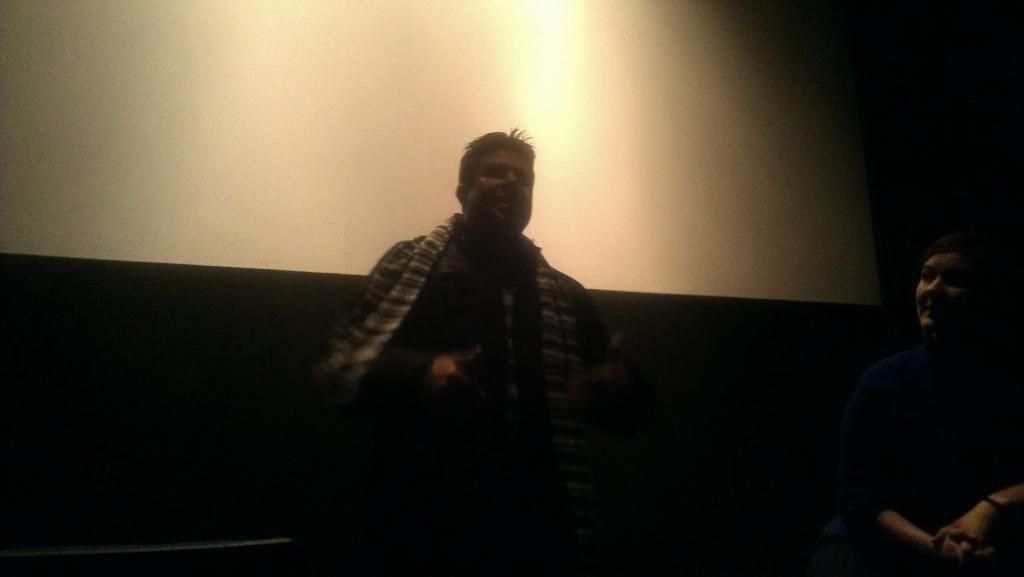Neither of these films are great, but they're pretty decent. And, hey, you've got to respect a guy who travels from Honduras to Boston to present his movie:

(Pardon the horrible photography; every other shot I took had bright red/yellow eyes, and when those show up in a post about a genre film festival, folks think you mean something by it!)
That would be El Xendra director Juan Caros Fanconi, who (along with some of the crew) managed to make it by the end of the movie. It was nearly 11pm by then, so there wasn't time for a big Q&A, although that's where the mention of El Xendra being the first of a planned trilogy with the second likely to start filming in June came from.
He mentioned that the movie played in various Central American markets already, and I kind of wondered how it travels. How tiered is the Spanish-language cinema market around the world? This is a pretty spiffy movie for Honduras and El Salvador (where parts took place and were shot), but how does it look next to the domestic product in Mexico, Chile, Argentina, Spain? Does it seem "too Central American" to those other markets?
I'll probably expand on the idea in a later entry, but it's been impressive to see what a small group is capable of making these days over the course of the festival, but being able to make something that looks pretty good doesn't seem to be helping indie guys compete with the big boys; the big boys can just do even more. So, is the new technology creating more opportunities to hit it big, or just more strata?
Juan in a Million
* * ¼ (out of four)
Seen 12 February 2013 in Somerville Theatre #2 (Boston Sci-Fi Fest, video)
"Alone in the world" movies offer the independent science fiction filmmaker a fair amount of bang for their buck - you can get by with a very small cast, some unusually still establishing shots taken at the right time, and the sense of unease that comes from empty space where there should be crowds. You've got to do a bit more in the way of world-building, though, something Juan in a Million puts off until it may be too late.
As the movie starts, Juan Pablo (Sergio Allard) is recording a video message as part of his application for graduate school at Harvard. He sends it off and hits the sack for a quick nap before going to a friend's party, but when he finally awakens and goes, the music is playing but the place is empty. Upon further examination, the entire city of Algarrobo, Chile is empty, and while the utilities are running, there's only static on the TV and radio and nothing new posted on the internet. Juan is alone, with only a Maradona bobblehead and strange dreams of his ex-girlfriend Camila (Florencia Astrorga) for company.
There are a number of directions that one can go with this - there's a mystery to solve, a struggle for a life-long city dweller to survive, and the possibility of going insane without genuine human contact - and ideally, the filmmaker would be pursuing all three at once. What makes this movie frustrating for a considerable chunk of its length is that Allard (who, in addition to playing Juan, also writes, directs, produces, and edits) doesn't seriously pursue any of these avenues until fairly late in the game - and even then, his on-screen alter ego seems to fall into it.
Full review on eFilmCritic.
El Xendra
* * ¾ (out of four)
Seen 12 February 2013 in Somerville Theatre #2 (Boston Sci-Fi Fest, video)
El Xendra is impressively ambitious for a Honduran science fiction movie, and it actually does a better job of delivering on those ambitions than a lot of movies whose reviews start that way. It's not necessarily going to stand toe-to-toe with its equivalents from larger film industries, but it manages well enough that I hope filmmaker Juan Carlos Fanconi can do a little more next time.
Four Central American scientists - Carlos (Juan Pablo Olyslager), Diego (Fabian Sales), Marcela (Rocio Carranza), and Roberto "Doc" Hernandez (Boris Barraza) - who had previously worked together on the start of a project called "Time of No Time" in the United States - wake up in the middle of a clearing with no idea how they got there. Is it related to the mysterious event that somehow blacked out much of North America the previous month? Or something older - the legendary ciudad blanca of the Maya?
The main portion of the action takes place in January 2013, so, yes, the strange event would have taken place right around the supposed end of the Mayan calendar that got so much play last year. Its mythology is far more focused on science-fictional things than ancient gods as such (an opening title claims it is "inspired by real messages from extraterrestrial beings"), and eventually includes a little bit of everything, although seldom in gaudy fashion. Fanconi doles it out over the course of the movie and leaves plenty of room for further exploration, with two more movies planned (and production on the second scheduled for this summer), though this story ends in a fairly satisfying way.
Full review on eFilmCritic.
No comments:
Post a Comment